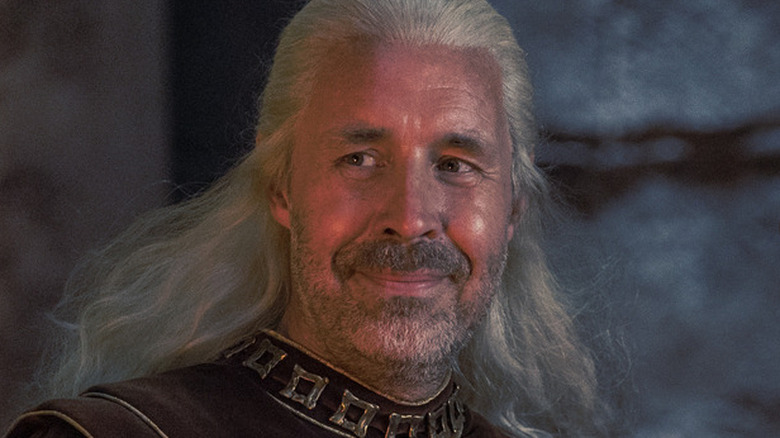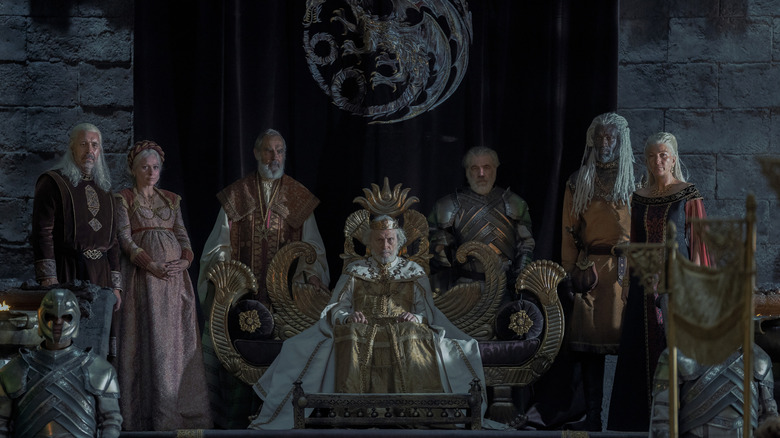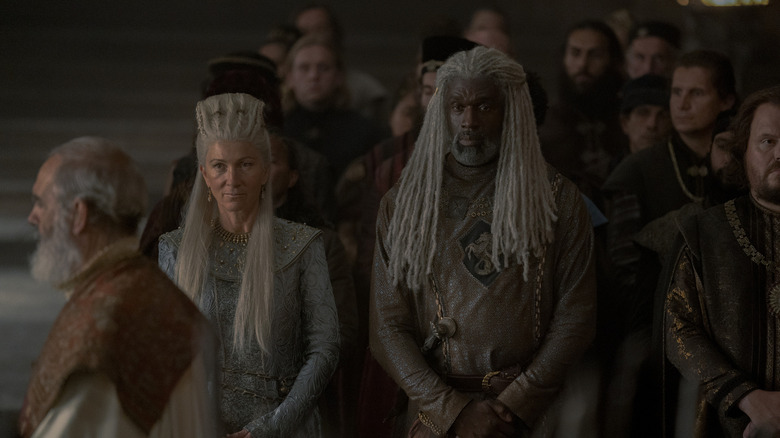House Of The Dragon's Great Council Of 101 AC Explained
Now that "House of the Dragon" has officially premiered on HBO, audiences across the world are returning en masse to Westeros — though it's a very different kingdom than the one introduced in "Game of Thrones." A deep dive into the battles that the Targaryen family fought amongst themselves over who would sit on the Iron Throne and rule the Seven Kingdoms, "House of the Dragon" is set centuries before Daenerys Targaryen emerges from the ashes of a funeral pyre with three baby dragons, and is set in a time when not only are the Targaryens the unchallenged rules of the realm, but dragons are par for the course.
The very first scene of this brand new series introduces a brand new historical event known belatedly as the Great Council of 101 AC, with the AC referring to the conquest of Aegon Targaryen and his subsequent crowning (it literally stands for "after the conquest"). So what exactly is this council, what do they decide, and what does it mean for the series as a whole?
The Great Council decides the next monarch of Westeros
Explained in a voiceover by Princess Rhaenyra — played in the first episode by Milly Alcock as a young version of the princess, though this voiceover is performed by Emma D'Arcy, who will take over the role after an eventual time jump — the Great Council of 101 AC determined who would rule Westeros when the Targaryen succession was called into question. With ten adult dragons helping them reign supreme, the Targaryens were, at the time, led by King Jaehaerys I, who had served for many peaceful, prosperous years.
However, after Jaehaerys' successors and sons, Aemon and Baelon, both die before they could take the throne, he's left with a choice: anoint his oldest child Princess Rhaenys (Eve Best) as the future ruler, or stick to tradition and choose Rhaenys' cousin Viserys, a man. It's also not only up to Jaehaerys; the decision is made by a council made up of Westerosi lords that he entrusts with the choice, so that a war would not break out over the line of succession.
Ultimately and predictably, Rhaenys, who has the strongest technical claim to the throne, is passed over for Viserys, who becomes king. The series then take us ahead another nine years — 172 years before Daenerys' birth — and into Viserys' rein, where, ironically, he is searching for an heir of his own.
There's more to the Great Council than you see in House of the Dragon
The Great Council is only briefly portrayed and explained in the series, basically serving as the main event of the pilot's cold open. However, in "Fire & Blood," the source material written by George R.R. Martin that serves as the blueprint for "House of the Dragon," there's a lot more to it. First of all, Jaehaerys did have another male child, Vaegon, but Vaegon is ultimately deemed ineligible for the throne due to the vows he took as an Archmaester of the Citadel.
Beyond that, Rhaenys is presented as the only viable option — aside from Viserys — in the show, but according to Martin's lore, there were originally fourteen contenders which were whittled down to two. Rhaenys, however, was not one of them; rather, the other option was her son, Laenor, fathered by the powerful Lord Corlys Velaryon (played in the series by Steve Touissant). Despite Laenor's solid claim, Viserys is chosen due to the fact that Laenor comes from a female line of succession, and Rhaenys is, as she is in the series, is overlooked.
"House of the Dragon" airs on Sunday nights at 9 PM EST on HBO and HBO Max.


